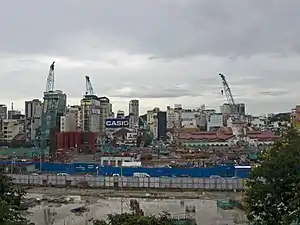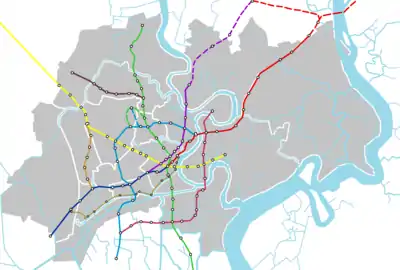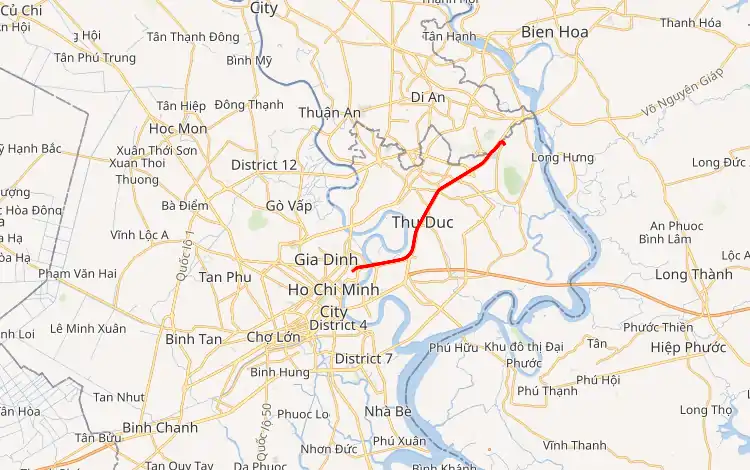Ho Chi Minh City Metro
The Ho Chi Minh City Metro (Vietnamese: Dự án đường sắt đô thị Thành phố Hồ Chí Minh, lit. 'Ho Chi Minh City urban railway project') is a planned rapid transit network that will serve Ho Chi Minh City in Vietnam.
 | |||
| Overview | |||
|---|---|---|---|
| Native name | Dự án đường sắt đô thị Thành phố Hồ Chí Minh | ||
| Owner | Management Authority for Urban Railways | ||
| Locale | Ho Chi Minh City, Vietnam | ||
| Transit type | Rapid transit | ||
| Number of lines | 1 (under construction) 7 (planned) | ||
| Number of stations | 14 (under construction) | ||
| Operation | |||
| Operation will start | Q4 2021[1] | ||
| Headway | 2 minutes[2] | ||
| Technical | |||
| System length | 19.7 km (12.2 mi) (Line 1) | ||
| Track gauge | 1,435 mm (4 ft 8 1⁄2 in) standard gauge[2] | ||
| Electrification | Overhead line | ||
| Top speed | 80 km/h (50 mph)[2] | ||
| |||
Its first metro line, Line 1, started construction in 2012 and is scheduled for completion in 2021. As of 2019, most of the network is in the planning stages, with projects for different lines advancing as funds become available.[3]
History
Earlier proposals (2001–2012)
The network was first proposed in 2001[2] as part of a comprehensive public transport network plan including Ho Chi Minh City and neighbouring provinces, with the aim of avoiding the severe traffic congestion problems that have affected other Asian cities (such as Hanoi).[4]
According to the original master plan submitted in February 2001, the metro system would comprise six lines. The plan was originally expected to cost US$1.5 billion over 10 years, as part of a US$3.35 billion program to build a rail network serving Ho Chi Minh City and surrounding provinces.[5]
The plan was revised in 2007 and proposed no less than six urban rail lines. The city’s transport development master plan to 2020 envisages developing three monorail or light rail lines with a total length of 37 kilometres (23 mi) and six underground metro routes with a total length of 107 kilometres (66 mi).[6] Bến Thành Market in District 1, already a major hub for bus traffic, will become a major hub connecting several lines.
Revised plan and construction (2013–present)

The latest plans for Ho Chi Minh City Metro, a revised version of the earlier proposal in 2007, was approved on 8 April 2013.[7][8] The network's first line, connecting Bến Thành Market and Suối Tiên Park in District 9, was originally scheduled for completion in 2014. A groundbreaking ceremony for Line 1 was held on 21 February 2008. However, due to funding issues, construction only began in 2012, pushing the project completion date to 2018.[9][10][11]
In September 2013, an agreement was reached with the Asian Development Bank, the European Investment Bank, and the Spanish Government to provide €850 million to finance the construction of Line 5, with any additional cost funded by the Vietnamese Government. A revised construction start of 2015 was provided.[12]
On 13 September 2017, the authorities announced that Line 1 will be delayed for two years. Cost overrun, audits, and delayed payments to contractors contributed to the delay. The targeted completion date is now set at 2020.[1] Planners expect the route to serve more than 160,000 passengers daily upon launch, increasing to 635,000 by 2030 and 800,000 by 2040. All stations along the route are expected to accommodate the disabled, with automatic ticket vending machines, telephone booths, restrooms, subway doors and information bulletins accessible to the handicapped and visually impaired.
On 28 January 2019, MAUR Director of Project Management Unit Duong Huu Hoa stated that as of December 2018, construction progress of Line 1 has reached 62%, below the target of 65%. The project has been criticised by the local press for its repeated delays.[13]
Construction of Line 2 was initially scheduled to begin in 2013, with operations beginning in 2018. However, on 13 September 2017, the local authorities have requested to the Prime Minister to push back the construction of the second line to 2020 with completion in 2024. As of February 2020, the expected opening date for the first line is the end of 2021.[14] No reason was given for the delay. The estimated cost of the line has also ballooned from $1.3 billion to more than $2.1 billion.[15]
In December 2020, it was reported that one of the Elastomeric Laminated Bearing pads, which hold up the concrete beams of the viaducts for Line 1, had fallen off, causing one of the beams to be displaced and crack. Research on the incident is still being done by the contractor.[16]
Lines

| Line color | Line | Line name | Length | Stations | Terminus | Note |
|---|---|---|---|---|---|---|
| Red | S: Sài Gòn line | 19.7 km | 14 | Bến Thành ↔ Suối Tiên Park |
Under construction[17] Option to extend to Biên Hoà or Bình Dương | |
| Yellow | B: Bà Quẹo line | 48 km | 42 | Northwest Town (Củ Chi) ↔ Thủ Thiêm |
Construction set to resume in 2020 Phase 1: Bến Thành-Tham Lương with 11 stations. [18] | |
| Blue | K: Tân Kiên line | 19.8 km | 17 | Bến Thành ↔ Tân Kiên |
planned Option to extend to Tân An | |
| Purple | N: Thị Nghè line | 12.2 km | 10 | Cộng Hoà Junction ↔ Hiệp Binh Phước |
planned Option to extend to Thủ Dầu Một and connect with Bình Dương Metro | |
| Green | G: Gò Vấp line | 35.75 km | 32 | Thạnh Xuân ↔ Hiệp Phước |
planned | |
| Green | T: Tân Sơn Nhất line | 3.2 km | 3 | Gia Định Park (Line 4) ↔ Lăng Cha Cả (Line 5) |
planned Phase 1: Tân Sơn Nhất Airport - Lăng Cha Cả[19] | |
| Light blue | C: Cần Giuộc line | 23.39 km | 22 | New Cần Giuộc Bus Station ↔ Saigon Bridge |
planned Phase 1: Bảy Hiền-Saigon Bridge[20] | |
| Gold | Đ: Đầm Sen line | 6.8 km | 7 | Bà Quẹo Junction ↔ Phú Lâm Junction |
planned | |
The plan also includes 3 lines of tramway and monorail:
| Line description | Length | Stations | Route | Note |
|---|---|---|---|---|
| Tramway 1 | 12.8 km | 6 | Ba Son (Line 1) - Võ Văn Kiệt - Lý Chiêu Hoàng - Current Western Bus Station (Bến xe Miền Tây) | planned Option to extend to Bình Quới |
| Monorail 2 | 27.2 km | ? | National Highway 50 - Xuân Thuỷ (District 2) - Bình Quới | planned |
| Monorail 3 | 16.5 km | ? | Junction Nguyễn Oanh and Phan Văn Trị - Quang Trung Software City - Tân Chánh Hiệp Railway Station | planned |
Fares and ticketing
To encourage high ridership, fares on the Ho Chi Minh City Metro network will be set low, on the order of VND 2,500 (about US$0.11). By comparison, bus fares within the city are generally VND 3,000 (as of 2013, bus fares are at around VND 5,000 to VND 7,000 [21][22]). A common farecard, valid on both the metro network and bus network, will be made available as well.[23]
Network Map

See also
Footnotes
Notes and references
- References
- "Ho Chi Minh City selects underground contractors". Railway Gazette International. 26 July 2014. Retrieved 2015-04-25.
- Robert Schwandl (2007). "Ho Chi Minh City Metro". UrbanRail.net. Retrieved 2010-05-26.
- "Saigon metro lines cost escalation cleared, construction not to stop". VNExpress.net. Retrieved 9 November 2019.
- "Ho Chi Minh City plans to build a metro network". International Railway Journal. 1 May 2002. Archived from the original on 1 June 2010. Retrieved 2010-05-27.
- "Ho Chi Minh City Metro Plan". International Railway Journal. January 2001. Archived from the original on 2010-06-01. Retrieved 2010-05-26.
- M.Vong (10 April 2007). "Vietnam to build first subway with Japanese aid". Thanh Nien. Retrieved 2010-05-14.
- "Decision 568/QĐ-TTg". Thu Vien Phap Luat. Retrieved 25 April 2017.
- "Master plan of urban railways system". MAUR. Archived from the original on 25 April 2017. Retrieved 25 April 2017.
- http://www.railway-technology.com/projects/vietnammetro/
- "The work begins: HCM City to have first subway in 2014". VietnamNet Bridge. 30 April 2010.
- "Work starts on Ho Chi Minh City metro line". International Railway Journal. 24 August 2010. Archived from the original on 28 August 2010. Retrieved 2010-08-24.
- "City Metro Project receives Euro850 million funding". SGGP. 12 September 2013. Archived from the original on 13 December 2013. Retrieved 2013-09-12.
- https://tuoitre.vn/nguy-co-tam-dung-du-an-metro-so-1-tphcm-hau-qua-khon-luong-20171014080245798.htm
- [https://vietnaminsider.vn/first-metro-line-in-ho-chi-minh-to-launch-next-year/ Vietnam Insider, "First Metro Line in Ho Chi Minh to Launch Next Year", 19 February 2020.
- TheLEADER.VN (2018-01-18). "HCM City calls for additional US$17.8 billion in eight urban railway routes". TheLEADER. Retrieved 2018-05-09.
- VnExpress. "Unexplained HCMC metro line cracks raise serious concerns - VnExpress International". VnExpress International – Latest news, business, travel and analysis from Vietnam. Retrieved 2020-12-08.
- "TP HCM khởi công ga ngầm metro Bến Thành". Retrieved 25 April 2017.
- "TPHCM khởi công tuyến tàu điện ngầm số 2". Retrieved 25 April 2017.
- "5 tuyến metro của TP HCM đang triển khai đến đâu?". Retrieved 25 April 2017.
- "TPHCM: Tuyến metro số 2 và 5 đủ vốn vẫn chưa thể khởi công". Archived from the original on 2 June 2017. Retrieved 25 April 2017.
- "Bus fares to be increased since October 1 in Hanoi". VNExpress. 22 August 2012. Retrieved 2013-06-01.
- "Bus fares to be increased in Ho Chi Minh city". VNExpress. 25 December 2012. Retrieved 2013-06-01.
- David M. Lenard (3 November 2004). "Ho Chi Minh's subway dreams". Asia Times. Retrieved 2010-06-11.
- Bibliography
- MVA Asia Ltd (October 2006). "Preparing the Ho Chi Minh City Metro Rail System Project: Technical Assistance Reports" (PDF). Asian Development Bank. Archived from the original (PDF) on 2010-06-01. Retrieved 2010-06-10.
- MVA Asia Ltd (October 2006). "Preparing the Ho Chi Minh City Metro Rail System Project: Consultant's Reports" (PDF). Asian Development Bank. Archived from the original (PDF) on 2011-06-07. Retrieved 2010-06-10.
External links
| Wikimedia Commons has media related to Ho Chi Minh City Metro. |
